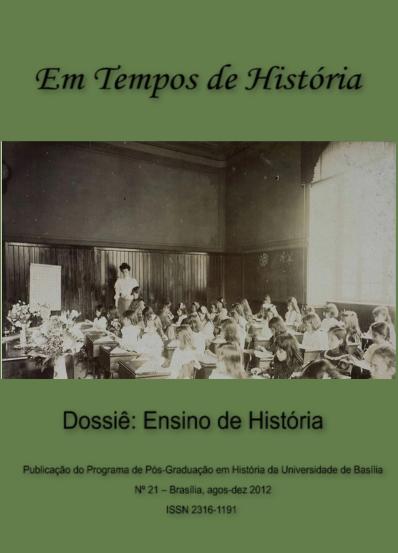Ideias de alunos sobre o “seu” passado doloroso a Guerra Colonial Portuguesa*
DOI:
https://doi.org/10.26512/emtempos.v0i21.19835Keywords:
Didactics of History, Responsability, Painful pastAbstract
When one mentions identity, European conscientiousness, tolerance, civic intervention, soli-darity… History is requested to perform a predominantly social role and function. On the oth-er hand, when one asks to the European youth about the significance of History, we can see in their responses the “valorisation of History as a source of learning” and the respect for the monumentality of the past. The project that we are presenting, “Enseigner les passés doulou-reux en Europe”, has the clear purpose of avoiding forgetfulness, bring historic density that guarantees the correct knowledge of the past, provide the students with critical competences to assume the responsibilities of the “memory duties”. The focus of this research is to try to understand how young people think about the question of the historic reparation as, for in-stance, ponder about the justification, viability, motives and effects of the reparation of historic injustice. These reflections are an important window to the historic conscientiousness of young people: by observing how they think about the matter of historic reparation, we can see how they conceive the limits of individual and collective responsibility and also the moral responsibility of the State and its citizens.
Downloads
References
ANSART, Pierre. “História e memória dos ressentimentos”, in Stella Bresciani; Marcia Naxara (orgs.), Memória (res)sentimento: indagações sobre uma questão sensível. São Paulo: Editora da Unicamp, 2001, p. 15-36.
BARTON, Keith C.; LEVSTIK, Linda. Teaching History for the common good. Nova Iorque: Routledge, 2004.
CERRI, Luís Fernando. “Os conceitos de consciência histórica e os desafios da didática da História”. In Revista de História Regional 6 (2), 2001. p. 93-112.
FERRO, Marc. O Ressentimento na História ”“ Compreender o nosso tempo. Lisboa: Teorema, 2009.
GADAMER, Hans-Georg. O problema da consciência histórica. Rio de Janeiro: Editora FGV, 1998.
GAGO, Marília. Consciência histórica e narrativa na aula de História: conceções de professores. Braga: Uni-versidade do Minho [Dissertação de doutoramento], 2007.
KITZINGER, Jenny. “The methodology of Focus Groups: the importance of interaction be-tween research par-ticipants”. In Sociology of Health & Illness, Volume 16, Issue 1, January, 1994, p. 103-121.
LOFSTROM, Jan. The Finnish high school students speak on historical reparations: a note on a study of histor-ical consciousness. In. “From historical research to school history: Problems, relations, challenges. Yearbook International Society for History Didactics”, Volume 33, 2012. Artigo facultado pelo autor e membro do projeto “Enseigner les passes douloureux en Europe”.
MATTOSO, José. Levantar o Céu. Os labirintos da Sabedoria. Lisboa: Temas e Debates, 2012.
MOLPECERES, António. “Conflictos: la memoria de los alumnos ”“ De la Guerra Civil a la transición”. In Ãber ”“ Didática de las Ciências Sociales, Geografia e Historia, nº 69, júlio, agosto, septiembre, Barcelona, Grão, 2011, p. 21-28.
NORA, Pierre. Les lieux de mémoire. Paris: Gallimard, 1984.
OS NEGATIVOS DA NOSSA HISTÓRIA. O olhar proibido sobre a guerra e as colónias. Artigo publicado no Jornal “Público”, revista “Ipsilon” de 20 de junho de 2012.
PAIS, José Machado, Consciência Histórica e Identidade. Os Jovens Portugueses num contexto europeu. Lisbo-a: Celta Editora, 1999.
POLLAK, Michael, “Memória, esquecimento e silêncio”. In Estudos Históricos, 3, 1989, p. 3-15.
POLLAK, Michael. “Memória e Identidade Social”. In Estudos Históricos, 10, 1992, p. 200-212.
RICOEUR, Paul. La mémoire, l’histoire, l’oubli. Paris: Seuil, 2000.
RUSEN, Jorn. Jorn Rusen e o Ensino de História. Paraná: Editora UFPR, p. 112. [Trata-se de uma coletânea com textos de Rusen organizada por Maria Auxiliadora Schmidt, Isabel Barca e Estevâo de Rezende Martins], 2012.
SANTIAGO, Maria José Tíscar . O 25 de abril e o Conselho de Estado. A Questão das Atas. Lisboa: Edições Colibri 2012.
SCHELER, Max; FRINGS, M. S. Ressentiment. Milwaukee, Wis.: Marquette University Press, 1994.
Downloads
Published
How to Cite
Issue
Section
License
Autores que publicam nesta revista concordam com os seguintes termos:
- Autores mantém os direitos autorais e concedem à revista o direito de primeira publicação, sendo o trabalho simultaneamente licenciado sob a Creative Commons Attribution License , licença que permite que outros remixem, adaptem e criem a partir do seu trabalho para fins não comerciais, e embora os novos trabalhos tenham de lhe atribuir o devido crédito e não possam ser usados para fins comerciais, os usuários não têm de licenciar esses trabalhos derivados sob os mesmos termos.
- Autores têm autorização para assumir contratos adicionais separadamente, para distribuição não-exclusiva da versão do trabalho publicada nesta revista (ex.: publicar em repositório institucional ou como capítulo de livro), com reconhecimento de autoria e publicação inicial nesta revista.
- Autores têm permissão e são estimulados a publicar e distribuir seu trabalho online (ex.: em repositórios institucionais ou na sua página pessoal) a qualquer ponto antes ou durante o processo editorial, já que isso pode gerar alterações produtivas, bem como aumentar o impacto e a citação do trabalho publicado (Veja O Efeito do Acesso Livre).













